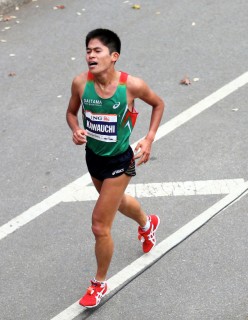Loading
Search
▼ How This Working Man Became Japan's Most Controversial Marathoner
- Category:Other

FITTISH
One guy, one not-super-fast-or-important guy has sort of spanked the elite running establishments of Japan, and the US of A. That guy is Japanese government clerk Yuki Kawauchi, pronounced Kow wah OO chee. He'll be part of the elite men's field in Sunday's NYC Marathon.
First, the spanking. In 2013, Kawauchi, a self-coached, 40 hour/week government worker, ran eleven marathons (most top marathoners run two, maybe three, marathons per year). His average time in those eleven outings was faster than the top eleven US marathon times, run by all Americans. Four of Kawauchi's eleven marathons were sub-2:10 (still the benchmark for elite status, though East Africans are often five minutes faster). In the history of US marathoning, there was only one year in which the entire US produced more,five, sub-2:10 performances. The US is lucky to have three sub-2:10 performances in a given year, usually posted by three different people.
Though Japan's corporate running system has produced a raft of sub-2:10 marathon performances lately, that resurgence has largely been a reaction to Kawauchi's embarrassing takedown of Japan's top corporate star in the 2011 Tokyo Marathon. Kawauchi, then an unknown 23-year-old with a full-time job, went by the corporate golden boy—who essentially ran for a living with salary, coaching, teammates, gear, all provided—at about 24 miles and placed third, the top Japanese runner, in 2:08:37. Kawauchi's best, 2:08:14, was set last year: His 2:09:36 this year is the second-fastest by a Japanese athlete.
Author of the blog Japan Running News, and the English-speaking world's portal into the insular world of Japanese running, Brett Larner, said of Kawauchi's effect on that establishment, "He's been a provocateur, a catalyst. He's been very outspoken about the shortcomings of the corporate system and that pisses a lot of people off; some people really despise him. They will come to a race only to beat Yuki. He loves it; they're responding to him. Every year since his 2011 breakthrough, Japan has had ten sub-2:10 marathons."
But Kawauchi is not out to humiliate anyone; it's merely a by-product of his paradoxical nature. He's very nonconformist in a conformist culture ("It's hard to go your own way in Japan," said Larner); he's a runner who is "despised" by many in the running community but adored by the Japanese public; his success has come by being ruggedly independent and brave— traits associated with American culture—but he's embraced by the Japanese for bringing back traditional Japanese values of authenticity, honor, honesty, sincerity, humility—traits they find lacking in products of the corporate system. And, indeed, his actions, shaving his his head in shame when he failed to qualify for the 2012 Olympic team smack of 110% Japanese.
His unswerving honesty and sincerity seem almost child-like, yet his sense of responsibility and accountability toward his own code of ethics and his fans is a level of adulthood rarely observed in sports figures today. Witness: Prior to the October 3rd Asian Games marathon (one month ago—unthinkably close for any other runner), Kawauchi said if he didn't win gold, he would remove himself from contention for the 2015 World Championship team. In a teeth-gritted sprint finish, Kawauchi placed third, four seconds out of first. True to his word, he said he would not run any of the selection races for the World Championships and would not attempt another world-level berth until he's improved his marathon time.
Another paradox, watch the end of that video, or any of his other finishes that find him collapsed, wrecked, carted off on a stretcher, and think about his insistence that he runs for fun.
"He's a rebel government clerk, which is an oxymoron in itself, and has been vocal in encouraging people to try other ways, that you don't have to be a cog in the system," said Larner, "but he's so dedicated to his job, he rarely runs outside Japan so he won't have to take a day off."
His running follows similarly contradictory patterns: He races almost every weekend (though to be fair, Larner said, he uses many half marathons as training runs for a less frequent target marathon), a program on which most top runners could not even survive much less show improvement. He refuses offers of sponsorship, a spot on a corporate team, even a gym membership, all things most elites think of as essential to getting the job done. Though Japan has had many distance running stars, Kawauchi said he is inspired by runners who have had long careers, like Lee Troop of Australia, Chema Martinez of Spain, and Haile Gebrselassie of Ethiopia.
In his second trip to New York City (he was 11th in last year's NYC Marathon in 2:12:29, see photo above), I sat down in the Javits Center with Kawauchi and Larner, who translated. Dressed in a Christmas-colored wind suit, Kawauchi bowed and shook my hand, spoke easily and laughed often. On our way out through the marathon expo, an experience he's had in different cities 33 times this year alone (this is his 40th career marathon, since 2009), he snapped photos, picked up brochures from other marathons and engaged in a little high-knee jogging. He seemed utterly delighted.
- November 4, 2014
- Comment (0)
- Trackback(0)

